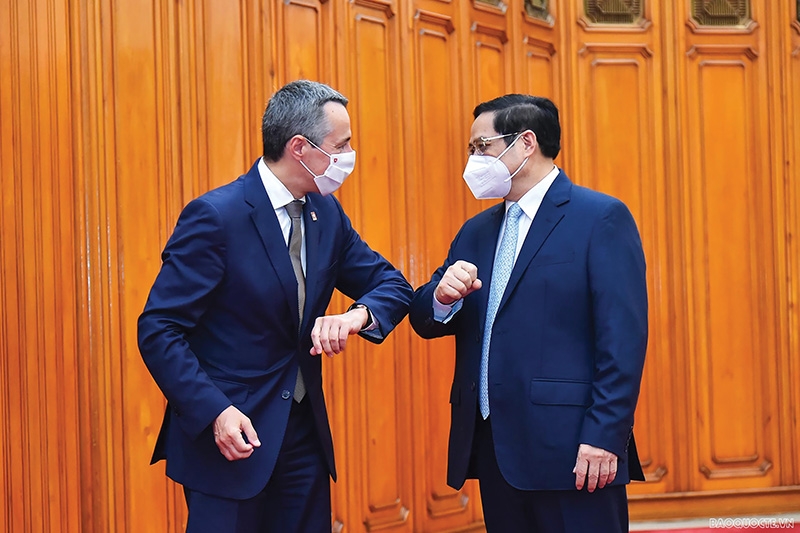Members look for quick EFTA accord
 |
| Prime Minister Pham Minh Chinh (right) met with Ignazio Cassis, Vice President and Minister of Foreign Affairs of the Swiss Federation. Photo: Tuan Anh |
On August 5, Ignazio Cassis, Vice President and Minister of Foreign Affairs of the Swiss Federation, met with Prime Minister Pham Minh Chinh and leaders of some ministries within his official visit to Vietnam on August 4-6 to discuss some important issues between both nations, including a push for the free trade agreement (FTA) negotiation process between Vietnam and the bloc. To reach such a deal with the European Free Trade Area (EFTA) members, Vietnam must add value through higher commitments than those of the World Trade Organization. But so far, the negotiation process between both sides has not been completed.
In Southeast Asia, EFTA member states have agreements with the Philippines and Indonesia. But for Vietnam, the EFTA only offers about 87 per cent of the tariff reductions that these countries had been guaranteed partners – a very low level, even lower than the standard agreements Vietnam has signed. Switzerland wants all the contents to have the same level of commitment as in the EU-Vietnam FTA.
Expectations of higher trade growth or new waves of investments will have to wait as the negotiation process almost stopped after the 16th round in Oslo in 2018. Back then, problems related to intellectual property and government procurements appeared – two important contents mentioned in the EFTA Convention. The EFTA Convention, signed in 1960, includes basic rules regarding free trade in goods and disciplines.
An agreement with the EFTA will likely tighten trade relations between Europe and Vietnam, especially on the back of the existing FTAs with Europe and the United Kingdom. Vice President Cassis asserted that Switzerland is ready to work with Vietnam to conclude the negotiations.
The completion of the trade deal will likely also contribute to helping Switzerland strengthen its position as one of the most competitive economies in the world. The Swiss government, with its investment orientation abroad, has allowed an increasing number of companies to invest and do business in Vietnam.
As of July 20, Switzerland has 177 valid investment projects in Vietnam, registered at $1.92 billion, ranking 20th out of 140 countries and territories with direct investments in Vietnam.
According to Swiss statistics, the total two-way trade turnover in the last five years has achieved an average growth rate of nearly 20 per cent per year. About 20,000 jobs have been created from large Swiss corporations in Vietnam, such as Nestlé in food and beverages, Novatis/Ciba-Sandoz in chemicals and pharmaceuticals, and ABB in electrical equipment.
Investors from the EFTA members would mainly participate in manufacturing, infrastructure, education, tourism and hospitality, IT, and banking and finance as Vietnam transforms its economic development model to one based on high technologies and green growth.
Vietnam’s new Law on Investment provides many incentives, creating favourable conditions for overseas investors, said lawyer Pierre Schifferli at the seminar “Vietnam: An Open and Dynamic Market – Opportunities for Swiss Enterprises and Investors” held on July 20. Schifferli’s wife is among these investors and currently participates in Phan Thiet’s tourism and hospitality sector. “Vietnam’s legal system has been relatively complete in most fields, with many factors attractive for overseas financiers, such as high and stable economic growth and open policies,” Schifferli said.
The focus of FTAs lies on liberalising trade and reducing import taxes. In all FTAs, countries and organisations aim to make commitments to all items in the tariff schedule. Along with that comes the expansion of non-discriminatory services and investments between domestic and foreign investors.
“It’s still possible to conclude negotiations at the end of 2021 if the EFTA adjusts its position in areas that have not been reached yet,” said Luong Hoang Thai, director of the Multilateral Trade Policy Department under the Ministry of Industry and Trade – the unit in charge of national trade negotiations. “We have reached agreements in many areas, with the core contents completed. However, intellectual property and government procurements are issues that need to be resolved,” said Thai.
What the stars mean:
★ Poor ★ ★ Promising ★★★ Good ★★★★ Very good ★★★★★ Exceptional
Related Contents
Latest News
More News
- VinaCapital launches Vietnam's first two strategic-beta ETFs (February 26, 2026 | 09:00)
- PM sets five key tasks to accelerate sci-tech development (February 26, 2026 | 08:00)
- PM outlines new tasks for healthcare sector (February 25, 2026 | 16:00)
- Citi report finds global trade transformed by tariffs and AI (February 25, 2026 | 10:49)
- Vietnam sets ambitious dairy growth targets (February 24, 2026 | 18:00)
- Vietnam, New Zealand seek level-up in ties (February 19, 2026 | 18:06)
- Untapped potential in relations with Indonesia (February 19, 2026 | 17:56)
- German strengths match Vietnamese aspirations (February 19, 2026 | 17:40)
- Vietnam’s pivotal year for advancing sustainability (February 19, 2026 | 08:44)
- Strengthening the core role of industry and trade (February 19, 2026 | 08:35)

 Tag:
Tag:




















 Mobile Version
Mobile Version